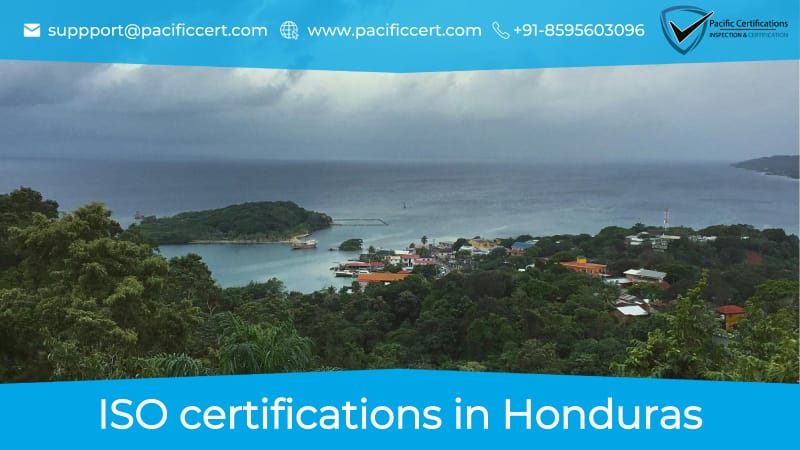ISO Certifications in Honduras, Popular Standards, Requirements and Benefits

Introduction
ISO certifications help organizations ensure their products, services, and processes meet international quality, safety, and efficiency benchmarks. In Honduras, achieving ISO certification can significantly enhance an organization’s reputation, operational efficiency, and market competitiveness.
Applicable ISO standards
Several ISO standards are applicable across various industries in Honduras. Some of the key standards include:
ISO 9001:2015 - Quality Management Systems
ISO 14001:2015 - Environmental Management Systems
ISO 45001:2018 - Occupational Health and Safety Management Systems
ISO 27001:2022 - Information Security Management Systems
ISO 22000:2018 - Food Safety Management Systems
ISO 50001:2018 - Energy Management Systems
Click here to find out more applicable standards to your industry
How We Can Help?
At Pacific Certifications, we are committed to helping organizations in Honduras achieve and maintain their ISO certifications. Our comprehensive services include:
Certification Audits: Performing the official certification audit to assess compliance with ISO standards.
Continuous Improvement: Offering post-certification support to ensure continuous improvement and compliance.
Achieving ISO certification in Honduras is a strategic move towards operational excellence and market leadership. At Pacific Certifications, we are dedicated to guiding you through the certification process with our expert audit and certification services.
Contact us today at [email protected] to start your journey towards ISO certification.
Requirements of ISO Certifications in Honduras
Achieving ISO certification involves a series of steps that ensure an organization's processes, products, or services meet internationally recognized standards.
Below, we outline the key requirements for some of the most commonly sought ISO certifications in Honduras.
Management Commitment
Demonstrate top management’s commitment to implementing and maintaining the ISO standard.
Establish a clear vision, mission, and strategic objectives aligned with the standard.
Gap Analysis
Conduct a thorough gap analysis to identify existing practices and areas that need improvement to meet ISO requirements.
Training and Awareness
Provide training to employees to ensure they understand the standard’s requirements and the importance of compliance.
Foster a culture of quality and continuous improvement.
Documentation
Develop and maintain necessary documentation, including policies, procedures, work instructions, and records.
Ensure the documentation is up-to-date and reflects actual practices.
Implementation
Implement processes and practices that comply with the ISO standard’s requirements.
Ensure consistent application of these processes across the organization.
Internal Audits
Conduct regular internal audits to assess compliance with the ISO standard.
Identify non-conformities and areas for improvement.
Management Review
Conduct periodic management reviews to evaluate the effectiveness of the quality management system.
Review audit results, customer feedback, and performance metrics.
Continual Improvement
Establish mechanisms for continual improvement based on audit findings, customer feedback, and performance data.
Implement corrective and preventive actions to address non-conformities and improve processes.
Specific Requirements
ISO 9001:2015 - Quality Management Systems Requirements
Context of the Organization: Understand the organization’s context and determine the scope of the quality management system.
Leadership: Establish leadership responsibilities, including defining roles and responsibilities and ensuring customer focus.
Planning: Address risks and opportunities, set quality objectives, and plan changes.
Support: Provide necessary resources, ensure competence, and maintain documented information.
Operation: Plan and control operations, manage customer requirements, design and develop products/services, and control externally provided processes/products/services.
Performance Evaluation: Monitor, measure, analyze, and evaluate quality performance, and conduct internal audits and management reviews.
Improvement: Implement actions to improve the quality management system and address non-conformities.
ISO 14001:2015 - Environmental Management Systems Requirements
Environmental Policy: Develop an environmental policy that reflects the organization’s commitment to environmental management.
Planning: Identify environmental aspects, determine compliance obligations, and plan actions to address risks and opportunities.
Support: Ensure competence, awareness, and communication regarding environmental management.
Operation: Establish operational controls, prepare for emergency situations, and control outsourced processes.
Performance Evaluation: Monitor, measure, analyze, and evaluate environmental performance, conduct internal audits, and perform management reviews.
Improvement: Continually improve the environmental management system and address non-conformities.
ISO 45001:2018 - Occupational Health and Safety Management Systems Requirements
OH&S Policy: Develop an occupational health and safety policy that demonstrates a commitment to a safe and healthy workplace.
Planning: Identify hazards, assess risks, determine legal requirements, and plan actions to address risks and opportunities.
Support: Ensure resources, competence, awareness, and communication for OH&S management.
Operation: Implement operational planning and control, manage emergency situations, and control outsourced processes.
Performance Evaluation: Monitor, measure, analyze, and evaluate OH&S performance, conduct internal audits, and perform management reviews.
Improvement: Continually improve the OH&S management system and address non-conformities.
To achieve ISO certification and enhance your organization’s reputation, efficiency, and compliance, contact Pacific Certifications at [email protected].
Benefits of ISO Certifications in Honduras
ISO certifications help businesses to achieve a competitive edge, improve operational efficiency, and meet regulatory requirements. Below, we explore the key benefits of ISO certifications in Honduras.
Enhanced Credibility and Reputation
International Recognition: ISO certifications are globally recognized, demonstrating that an organization meets high-quality standards.
Trust and Confidence: Certification assures customers, partners, and stakeholders of the organization’s commitment to quality, safety, and efficiency.
Competitive Advantage: ISO certification can differentiate an organization from its competitors, making it more attractive to potential clients and partners.
Improved Operational Efficiency
Streamlined Processes: Implementing ISO standards helps organizations standardize and streamline their processes, reducing inefficiencies.
Consistent Quality: Ensuring consistent quality in products and services leads to higher customer satisfaction and reduced complaints.
Resource Optimization: Effective resource management minimizes waste, reduces costs, and enhances overall productivity.
Compliance with Regulatory Requirements
Regulatory Adherence: ISO certifications help organizations comply with local, national, and international regulations, avoiding legal issues and penalties.
Risk Management: Identifying and mitigating risks associated with operations ensures compliance with health, safety, and environmental regulations.
Enhanced Customer Satisfaction
Customer Focus: ISO standards prioritize understanding and meeting customer needs, leading to higher satisfaction levels.
Improved Customer Relationships: Consistently delivering quality products and services builds trust and strengthens customer relationships.
Reduced Complaints: Systematic processes and quality control reduce the likelihood of defects and customer complaints.
Employee Engagement and Morale
Clear Roles and Responsibilities: ISO standards define clear roles and responsibilities, improving organizational structure and employee understanding of their tasks.
Training and Development: Regular training and awareness programs ensure employees are knowledgeable and competent, enhancing job satisfaction.
Safe Work Environment: Implementing standards like ISO 45001 ensures a safe and healthy work environment, boosting employee morale and reducing absenteeism.
Market Expansion Opportunities
Access to New Markets: ISO certification can open doors to international markets that require suppliers to meet specific standards.
Increased Business Opportunities: Certified organizations are often preferred by clients and partners, leading to increased business opportunities.
Continuous Improvement
Ongoing Improvement: ISO standards promote a culture of continuous improvement, encouraging organizations to regularly review and enhance their processes.
Performance Monitoring: Systematic monitoring and evaluation of performance help identify areas for improvement and implement corrective actions.
Risk Management
Proactive Risk Identification: ISO standards require organizations to identify and assess risks proactively, leading to better preparedness.
Effective Risk Mitigation: Implementing preventive measures reduces the likelihood and impact of potential risks, ensuring business continuity.
Environmental Responsibility
Sustainability Practices: ISO 14001 promotes environmental management practices, helping organizations minimize their environmental impact.
Regulatory Compliance: Ensuring adherence to environmental regulations avoids penalties and enhances the organization’s reputation as a responsible entity.
Achieving ISO certification can significantly benefit your organization in Honduras by enhancing credibility, operational efficiency, and customer satisfaction.
Contact us today at [email protected] to start your journey towards ISO certification!
Which industries need ISO Certifications in Honduras?
Manufacturing
Ensures consistent quality in products and processes.
Benefits include improved product quality, customer satisfaction, and operational efficiency.
Helps manage environmental responsibilities.
Benefits include reduced environmental impact and compliance with environmental regulations.
ISO 45001:2018 - Occupational Health and Safety Management Systems, ensures safe and healthy working conditions, benefits include reduced workplace incidents and improved employee morale, ensures food safety from production to consumption and benefits include improved food safety practices and compliance with regulatory requirements.
ISO 9001:2015 - Quality Management Systems enhances overall quality management in food production and benefits include consistent product quality and customer trust.
Healthcare
Ensures quality in the design and manufacture of medical devices.
Benefits include improved product safety and regulatory compliance.
Enhances overall quality management in healthcare services.
Benefits include improved patient care and operational efficiency.
Ensures the safety of healthcare workers.
Benefits include reduced workplace hazards and improved employee wellbeing.
Information Technology
Ensures information security and data protection.
Benefits include improved data security, risk management, and customer trust.
Enhances IT service management.
Benefits include improved service quality and operational efficiency.
Construction
Ensures consistent quality in construction projects.
Benefits include improved project management, reduced defects, and customer satisfaction.
Ensures safety in construction sites.
Benefits include reduced accidents and improved worker safety.
Manages environmental impact in construction activities.
Benefits include reduced environmental footprint and regulatory compliance.
Agriculture
Ensures food safety in agricultural production.
Benefits include improved safety practices and market access.
Enhances quality management in agricultural processes.
Benefits include consistent product quality and operational efficiency.
Retail and Wholesale
Ensures consistent quality in retail and wholesale operations.
Benefits include improved customer satisfaction and operational efficiency.
Manages environmental impact in retail operations.
Benefits include reduced environmental footprint and compliance with regulations.
Tourism and Hospitality
Enhances quality management in tourism and hospitality services.
Benefits include improved customer satisfaction and service quality.
Ensures sustainable tourism practices.
Benefits include reduced environmental impact and enhanced reputation.
Conclusion
Achieving ISO certification can significantly benefit your organization by enhancing credibility, operational efficiency, and customer satisfaction.
Pacific Certifications is accredited by ABIS, in case you need support with ISO certification for your business in Honduras, please contact us at [email protected] or +91-8595603096.
Ready to get certified?
Contact Pacific Certifications to begin your certification journey today!
Suggested Certifications –
Read more: Pacific Blogs

